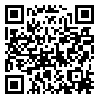

Volume 14, Issue 3 (12-2016)
RBS 2016, 14(3): 317-323 |
Back to browse issues page
Download citation:
BibTeX | RIS | EndNote | Medlars | ProCite | Reference Manager | RefWorks
Send citation to:



BibTeX | RIS | EndNote | Medlars | ProCite | Reference Manager | RefWorks
Send citation to:
خيرخواهان ن, نجفي م, محمدي فر م ع, ثقفي ن. Comparison of Attachment Style in Schizotypal Personality Disorder and Healthy Individuals. RBS 2016; 14 (3) :317-323
URL: http://rbs.mui.ac.ir/article-1-482-en.html
URL: http://rbs.mui.ac.ir/article-1-482-en.html
1- استاديار، گروه روانشناسی بالينی، دانشکده روانشناسی و علوم تربیتی، دانشگاه سمنان، سمنان، ايران
2- استاديار، گروه روانشناسی تربيتی، دانشکده روانشناسی و علوم تربیتی، دانشگاه سمنان، سمنان، ايران
3- روانپزشک، گروه روانپزشکی، دانشکده پزشکی، دانشگاه علوم پزشکی سمنان، سمنان، ايران
2- استاديار، گروه روانشناسی تربيتی، دانشکده روانشناسی و علوم تربیتی، دانشگاه سمنان، سمنان، ايران
3- روانپزشک، گروه روانپزشکی، دانشکده پزشکی، دانشگاه علوم پزشکی سمنان، سمنان، ايران
Abstract: (3666 Views)
Aim and Background: Insecure attachment style is one of the factors effective in many mental disorders. This study aimed to compare the attachment styles of individuals with schizotypal personality disorder (STPD) and healthy individuals. Methods and Materials: This research was a causal-comparative study. A sample of 90 participants (30 individuals with STPD who took drugs, 30 individuals with STDP who did not take drugs, and 30 healthy controls) were selected from among individuals referring to governmental and private psychiatric clinics through criterion-based sampling. The Adult Attachment Styles Questionnaire was used for data collection. Data were analyzed using multivariate analysis of variance (MANOVA). Findings: The difference in attachment styles between patients with STPD (with or without medication) and healthy subjects was significant (F = 0.526, P < 0.001). Individuals with STPD (with or without drugs) had lower scores on secure attachment style compared to the control group. In addition, the results showed significant differences between individuals with STPD (with or without drugs) and healthy individuals in terms of ambivalent and avoidant attachment styles. Conclusions: The results implicated the importance of attachment styles in STPD. Individuals with insecure attachment are more vulnerable to schizotypal traits experience and STPD.
| Rights and permissions | |
 |
This work is licensed under a Creative Commons Attribution-NonCommercial 4.0 International License. |



